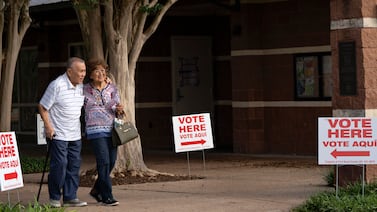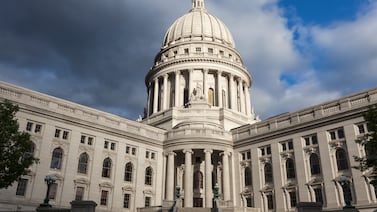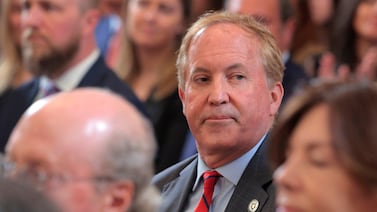Votebeat is a nonprofit news organization reporting on voting access and election administration across the U.S. Sign up for our free weekly newsletter to get the latest.
Democratic attorneys general in 19 states are together suing Trump over his sweeping executive order on elections, saying that it is an illegal attempt to usurp state control of elections that “would cause imminent and irreparable harm” if the courts don’t intervene.
The March 25 order, which Trump wrote would protect the integrity of elections, would require people to prove their citizenship when registering to vote. It would also set a national mail ballot receipt deadline of Election Day, require the U.S. Election Assistance Commission to rewrite voting machine certification standards, withhold federal funds from states that don’t use compliant machines, and require states to share their voter rolls with federal agencies.
The order “sows confusion and sets the stage for chaos in Plaintiff States’ election systems, together with the threat of disenfranchisement,” the states wrote in the complaint, which was filed in the U.S. District Court of Massachusetts on Thursday. The attorneys general emphasized that Congress has never required proof of citizenship to vote in federal elections and that states have the authority to dictate the deadline for mail ballots.
They also say that Trump cannot force states to require proof of voter citizenship, and threatening to withhold funding for not complying with provisions in the order violates the U.S. Constitution’s principles of federalism and separation of powers, and adds requirements on the money that weren’t imposed by Congress.
The attorneys general of Arizona, California, Colorado, Connecticut, Delaware, Hawaii, Illinois, Maine, Maryland, Massachusetts, Michigan, Minnesota, Nevada, New Jersey, New Mexico, New York, Rhode Island, Vermont, and Wisconsin are named plaintiffs. All are Democrats. The litigation was led by California Attorney General Rob Bonta and Nevada Attorney General Aaron Ford.
In a news release about the lawsuit, Bonta called the executive order a “blatantly illegal power grab and an attempt to disenfranchise voters.”
“Neither the Constitution nor Congress authorize the President’s attempted voting restrictions,” Bonta said in the release. “We will not be bullied by him. We will fight like hell in court to stop him.”
At a news conference announcing the lawsuit Thursday, Arizona Attorney General Kris Mayes said the executive order is unacceptable and unconstitutional.
“I will not allow our Legislature’s lawmaking ability to be trodden on by a wannabe king,” Mayes said.
Secretary of State Adrian Fontes said at the news conference that the executive order weakens election security.
“It is the very nature of our decentralized elections of our country that is a strength against foreign interference,” Fontes said, adding, “I don’t want Elon Musk and his crew of incompetence taking those voter rolls away from our office.”
Because Arizona law already requires proof of citizenship to vote in state and local elections, the state is not joining the challenge to that provision.
The state officials’ lawsuit comes on the heels of three others challenging the order, which is titled “Preserving and Protecting the Integrity of American Elections.” Earlier this week, Democrats and civil rights organizations filed three separate lawsuits in federal court in Washington, D.C., which have been consolidated before Judge Colleen Kollar-Kotelly.
Two of them were filed by arrays of nonprofit groups, including the League of United Latin American Citizens, the League of Women Voters, the NAACP, and others. Another was filed on behalf of Democratic national party committees and leadership.
The lawsuits all challenge the idea that Trump can order the U.S. Election Assistance Commission to change the federal voter registration form to require documents proving citizenship. Right now, the form requires voters to attest to their citizenship under penalty of perjury, but does not require documents to prove it.
It could cost some states millions to replace their voting machines to comply with the new rules.
Jen Fifield is a reporter for Votebeat based in Arizona. Contact Jen at jfifield@votebeat.org.





